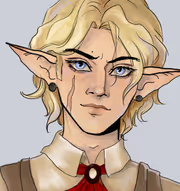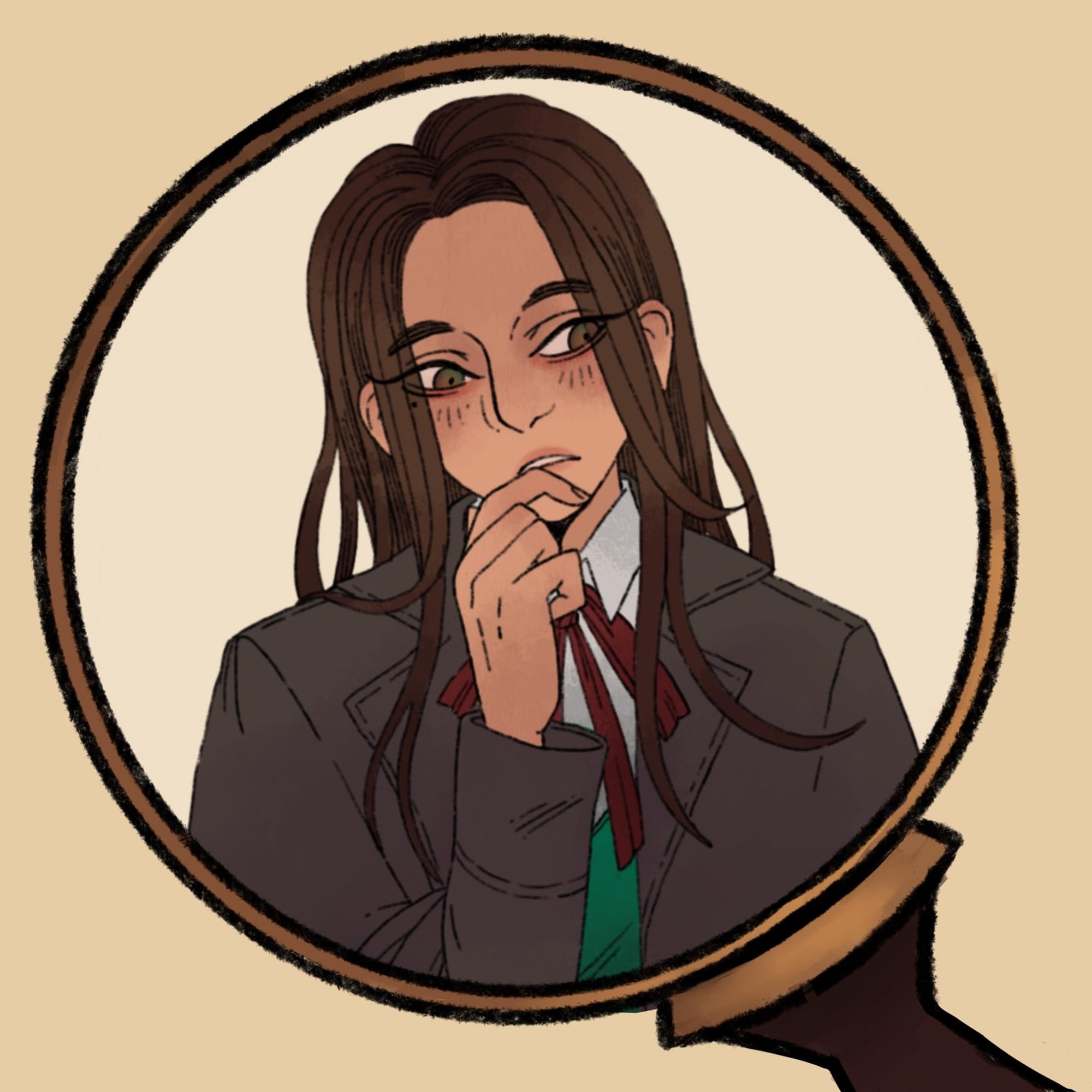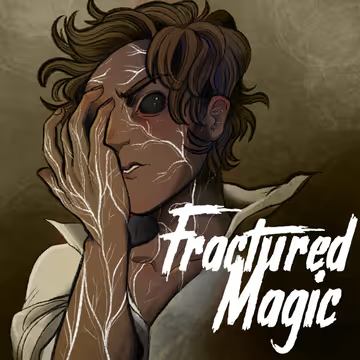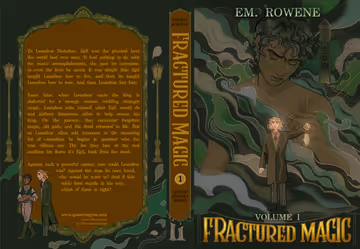Fractured Magic: Chapter Seventeen
Roman has a nightmare.
Fractured Magic is a fantasy webserial about political and personal accountability, ghosts both figurative and literal, and a pair of estranged friends who act like they’ve gone through the world’s messiest divorce.
CW: Brief reference to suicidal ideation and allusions to police violence.
Roman wandered through a silent forest. Above him, the overcast sky stretched through leafless branches that shot like lightning into its gray expanse. Roman followed the line of those branches down to their scraggly blue trunks, nothing like the trees around Gallonten. He knew them well, though. He knew this wood, knew this path. Worst of all, he knew where it led.
Beneath him, dead leaves lined the trail under a dusting of snow, autumn’s life wrung from this wood by winter’s icy grip. Roman’s breath clouded in front of him in bursts, but he couldn’t feel the cold. Still, he pulled his coat reflexively tighter as he continued down the path, heading toward the last place in the world he wanted to go. This dream compelled him on, an invisible thread reeling him in like a fish on a line.
Before he was ready for it, a dark shape loomed out of the fog. It solidified into a lonely cabin, one made from the same dark blue wood as the forest: the wood of the ibal tree, found only in Troas. The cabin stood as Roman had last seen it, its windows boarded shut and its door broken off the hinges. It tipped precariously to one side, and the messily thatched roof had begun to collapse inward.
Roman stepped into the clearing. No grass grew on the frozen ground that led up to the cabin. Nothing lived in this cold place, not anymore. Roman took another step toward the door, but a movement glimpsed out of the corner of his eye—the rustle of a skirt, the wave of a hand—stopped him. When he turned, all he saw was trees, their sickly shapes affording little coverage for anyone hoping to hide.
Someone laughed behind him and he spun again, this time finding a figure on the porch. She raised a hand to beckon him closer, but Roman couldn’t move.
“Catalina,” he breathed.
Catalina Rosario smiled. Or rather, this distorted dream version of her did. Roman had forgotten his own mother’s face so long ago that what had once been a world-shattering revelation had simply become a fact of life. The Catalina of his dreams, the Catalina that stood on the porch, was a blur, her features warping and transforming whenever he looked away. Only two things remained constant: her voice, always close to laughter, and his eyes, far lighter than his own. They were the honey-sweet tones of sunshine streaming through a bottle of whiskey.
“Amaimon!” she called, no longer looking at Roman. Roman started at the sound of his birth name; it had been a long time since he’d heard it, but Catalina wasn’t speaking to him. She ran down the steps, past Roman, and scooped a child into her arms. The child stared at Roman over his mother’s shoulder, golden eyes boring into Roman’s black ones.
Catalina’s clothes were all wrong, Roman noticed. His sleeping mind had put her in a modern Gallontean gown, all dark wool and structured drapery, but in life, she’d always worn traditional Corinidan dress. Even years after leaving her home and family to live with Roman’s father, years in cold, subdued Troas, she wore off-shoulder bodices, bright colors, and flowing skirts whenever the weather permitted.
“Well?” she asked, leaning back to examine her child’s face. The Corinish word, asked in a language nearly dead in Calaidia, had bittersweet nostalgia rising in Roman like bile. “Amaimon Roman Rosario, didn’t you miss your mother?”
“Yes,” the boy said seriously. “Don’t go away again.”
Catalina laughed and made no promises. She often went on trips, ostensibly across the sea to visit family, but she never brought Roman with. “When you’re older,” she used to say, when he asked. “Can I make it up to you, sweet child?” she said now, to the boy in her arms.
Amaimon considered this. “Tell me a story.”
“As you command,” Catalina said, wide eyes dancing with laughter. The boy seemed to know he was being made fun of and squirmed to be put down. “Hush. Be still, now. Must you be so serious, love? I’ll tell you your story.”
The pair faced Roman now, oblivious to his presence. Roman remembered dozens of moments like this. His mother knew many stories for someone her age, more than Roman knew even today, and she was good at telling them. She spoke to Amaimon softly, sweetly, using her free hand to make grand gestures, and Amaimon wore the same blank-faced expression he’d started with. Catalina was right; Roman had always been a serious child. He’d learned to stop taking life seriously when doing so just made him want to end it.
“I want to be like him,” Roman’s younger self said. “Like the hero in the story.”
Roman gave an amused snort at the same time as Catalina. “Don’t be foolish,” she said, teasing her son with a tap to the tip of his nose. “You can be better than that. Never settle for less, love.”
When Catalina and Amaimon started toward the open doorway, Roman braced himself for what came next. He’d had this dream enough times to have it memorized, enough times that he’d grown numb to it. This was where it all fell apart.
Next, a person would step out onto the porch, their features all shrouded in shadow except for the snakeskin boots on their feet.
Next, they would attack, and Catalina would fall.
Next, he’d watch his mother—or this dream approximation of her—die all over again.
This time, none of that happened. This time, pain crashed into Roman like a freight train. He grunted and fell to his knees, caught entirely off guard. Fire scorched his insides, his heart pumping the burning heat through his body with every one of its beats. It seared across his ribcage, trying to escape.
This was only a dream. He shouldn’t feel anything. He certainly shouldn’t be doubled over in agony, unable to move or breathe. How could this feel so real?
Distantly, he heard the dream carrying on without him: Catalina screamed. Amaimon cried. A warbled, distorted voice shouted. For once, Roman couldn’t pay it any mind.
Then, as suddenly as it began, the pain vanished. Roman stayed on the ground, folded in on himself and fighting to catch his breath, for a moment longer.
“Wake up,” he hissed, his breath clouding in front of him.
Of course, it wouldn’t be that easy. When the waking world still evaded him, he pushed himself up on shaky arms and saw that the scene had changed: the sky darkened, black ribbons of something alive and writhing shivering through the air. Some old memory tugged at Roman’s consciousness at the sight, urging him to remember.
He was distracted, though, by what lay before him. It wasn’t his dream-mother lying dead at the bottom of the stairs. That, he’d seen before. It was the man who knelt beside her, his hands covered in blood.
“Get lost,” Roman snapped without thinking. We winced as he stood, a hand over his heart as if that would stop the burn.
Egil tipped his head to one side. “I can’t leave you. I never will. What did you do to her?” he asked, looking down at Catalina.
“Do? I was a little busy, over here,” Roman said. He looked around. He’d dreamed the same dream for years and years; he knew the script, so why did it change now? What else could he alter? He was supposed to stay at Catalina’s side until he woke, but this time, he stormed past her into the house, hearing Egil pick himself up and follow. He didn’t know what he expected to find—some lingering sign of the figure with the snakeskin boots, maybe.
Those boots were all he could remember from that day, beyond the sight of his mother lying dead in the grass. He used to think that if he could just remember the person’s face, the hollow ache in his chest would subside. It was a child’s dream, an attempt to make sense of a traumatic event.
Inside, he found only darkness, cobwebs, and an interior he wasn’t convinced truly belonged to this house he’d grown up in, a place half-remembered in the way of dreams. Something told him he should keep looking, though. He’d forgotten something, and he might find it here, in these cobwebs of his memory.
“I don’t know what you expected,” Egil said from somewhere behind him. In the kitchen, Roman looked out the broken windows into the darkened forest. He watched mist swirl through the trees.
“Are you running again?” Egil asked, when he didn’t respond. Egil heaved. “How very like you. I thought we were done with that.”
Roman wanted to keep searching, but he couldn’t. Not with Egil whispering in his ear. Angry, hurting, Roman drew his sword and spun to attack, but he froze mid-swing when he found a red-headed maranet woman standing behind him of Egil. She looked down her nose at him, her expression dripping with contempt.
“Not going to do it?” she asked. When he didn’t move, she stepped up to his blade, letting it rest against her pale neck. “I hope you do a better job of killing me than I did of you.”
Carefully, Roman withdrew the sword and returned it to his sheath. “I won’t hurt you,” he said.
Evelyne Corscia sneered. “Always afraid to do what it takes. Keep it up and you’ll never find her.”
“Find who?” Roman asked, but Evelyne didn’t answer. He followed her gaze to something over his shoulder: outside the wide window, between the trees, a pair of glowing crimson eyes and a twisted smile faded back into the mist.
Roman sat up, the bedsheet tangled around his limbs making him panic until he realized where he was: in a trailer in Gallonten, thousands of miles away from Troas and his childhood home. He reached for the other side of the bed, for the warmth of a companion to reassure him he was there, that this place was real, but he was alone.
At that realization, Roman fell apart. As if it might stop the shivering, as if it might protect his raw edges, he wrapped his arms around himself. He felt exposed, like a ripped-off scab after this horrible day, after that dream cut him to shreds and left the pieces to flutter in the wind. He still felt echoes of that dream pain, rasping in his lungs when he drew a breath. He dug a thumb into his injured palm, wincing at the bite of it. It was a reminder: this pain was real. The dream was not.
In time, when the shaking subsided and only the pain in his hand remained, Roman scrubbed at his eyes. He didn’t know when these tears began to fall, but he knew he’d made a mess of himself. He wanted to find Dinara, but not in this state. Only once he’d pieced himself back together did he stand, hearing a thump from above just as he was about to leave the trailer. Outside, he climbed onto the trailer’s handrail, then up to the roof. Sure enough, there Dinara sat, her knees hugged to her chest and the moon hanging large and bright behind her like a frame.
“Star gazing, Di? You could’ve invited me along,” he said, keeping his tone light and hoping it was too dark for her to notice his red and puffy eyes.
She turned at the sound of his voice, expression still unguarded. In it, Roman saw all of her thoughts and fears and doubts laid bare. If he could see all of that, with the moon shining so brightly above him, he knew there was no hiding his own sorry state. “What are you doing awake?” she asked.
Roman made his way along the roof to sit beside her. “I’m always awake at strange hours of the night. You know that.”
“I didn’t wake you?”
“You didn’t wake me.”
Dinara reached up to touch his still-damp cheek. “You had one of your nightmares again,” she guessed, letting her hand fall when Roman leaned out of her touch.
“I’m fine,” he said reflexively. In the face of all his lies, though, he owed Dinara some truth. He wanted to tell her some truth. He wanted to tell her about his mother, about how she haunts him and has haunted him since childhood. He wanted to tell her about Unity, about Egil, about the Oracle of Damael. About all the people he’d trusted and hurt and lost, and worse, all the people who’d wrongly trusted him. But if he said any more, he might cry again, so he shrugged instead. “I’d ask you why you’re up, but I think I already know.”
Dinara looked away, the moonlight catching on her curls.
“You’re thinking about today?” he pressed.
“Yesterday, technically,” Dinara said, looking up at the sky. “It’s morning.”
“Yesterday, then.”
Dinara sighed. “I’m thinking about a lot of things,” she said, pointedly. It was clear she wanted Roman to offer something up first.
“I don’t mean to be evasive.”
“Evasive is putting it mildly, Roman! I feel like I’m worlds away from knowing you. Why won’t you just let me know you?”
Roman followed her gaze to the stars. He tracked the constellations until the warning tingle behind his eyes subsided. “You know me better than almost anyone else.”
“That’s not comforting. It’s sad.”
“Maybe,” Roman agreed, feeling a familiar loneliness creep in. “Dinara, if you really want to know, I can—”
“Tell me about last time,” Dinara said, not even waiting for him to finish. “When you had to flee Gallonten.”
Roman’s mouth snapped shut. While Dinara waited for him to continue, he stared out over the quiet camp, lost in thought. Eventually, he said, “I worked for Unity, but not by choice. While they never put me in a cage or a cell, I still couldn’t leave.”
“Why not?”
“An easy question to ask, but not to answer. It was psychological, mostly. They beat me down, taught me not to dream of freedom. I was supposed to be grateful—they saved me from the gallows, and because of that, they felt I belonged to them.” He watched Dinara, cataloging the changes in her expression when he said, “I had killed someone.”
There was fear there, in her eyes, and Roman knew with utter certainty that they wouldn’t make it to morning. Not together.
“It was an accident,” he added, as if that changed anything. Digging into the haze of old memories, he continued, “I was friendless and homeless, and I came to Gallonten naively thinking I could find a job, maybe save enough to finish my education. I had no idea what I was walking into, and the police then were even worse than they are now. A week into my stay, a group of them accosted me while I was trying to find somewhere to sleep. They were beating me, and I just reacted. I was so sure they were going to kill me. I killed one, wounded two others, and was arrested immediately after.”
Ignoring Dinara’s horrified expression, he continued, “Then Unity recruited me, promised everything I’d ever wanted. I stayed with them a long time, until I learned to hate them and everything they stood for. When I met Ivey by chance, I convinced him to help me. The rest is history.”
“History,” Dinara repeated. “What about the Oracle of Damael? How does she fit into this?”
“Dinara,” Roman said, gently, “This isn’t a world you want to be a part of.”
Dinara sighed. “Maybe you’re right.” Tears swam in her eyes, but her cheeks were dry and her voice was even as she asked, “Where does that leave us, Roman? If you can’t tell me about yourself and I can’t hear it? I’ve always felt like there was something missing, between us. Something you were holding back. I thought I could draw it out, but yesterday, you were more yourself than I’ve ever seen you. If you can’t be that with me...”
Roman rubbed his eyes. He was tired. “I know. You deserve better.”
“Maybe. But so do you.”
Roman wasn’t so sure.
“You’re still welcome to travel with us,” Dinara said, though her heart clearly wasn’t in it. “You’re part of the family. That won’t change.”
“No, I need to stay here,” Roman said, making it easier for them both. Now that the festival was wrapping up, the Players would soon be leaving Gallontena. When he smiled at her, it was almost genuine. “When the Players leave, what will you do? Where will you go?”
Dinara frowned, surprised at the question. She’d probably thought to stay with the Players, like she’d always done, but Roman saw the question ignite possibilities behind her eyes. “I don’t know,” she said, as surprised at her answer as she’d been at the question. “Maybe I’ll try something new.”
“Whatever you do, you’ll be great.”
“What about you? After today, everyone will be looking for you. Isn’t Gallonten the last place you should be?”
“I’m tired of running,” Roman said. He owed Dinara some truth, after all. It was easier to give it now that he needn’t fear her reaction, now that the worst had happened. He rested his chin on his knee and stared up at the sky. “When I worked for Unity, the things I did for them shattered me. You’ve glimpsed the broken pieces, but you’ve no idea how bad it really was. Even after years, I’m a badly patched vase one shove away from breaking all over again. But all this time, I’ve been so focused on not letting them hurt me that I missed them doing the same harm to others. Much as I want to tear Unity apart, brick by brick, I need to help Orean first.”
“Be careful, Roman,” Dinara breathed.
“I will,” Roman promised. Raising her hand to his lips, he kissed her for the last time. “I won’t be able to sleep anymore tonight, anyways, so I’ll leave you be. I’ll come back for my things tomorrow.”
“Okay,” Dinara tried to say, but no sound came out. “Goodbye, Roman.”
Roman didn’t bother climbing down from the trailer, just jumped, landing easily on the balls of his feet. As he walked away, an echo of his dream pain returned, like a fire burning over his heart. He embraced it, let it wash over him.
Thank you for reading! I am SO excited for the next arc of Fractured Magic. Roman is so badass, and his and Leandros' orbits circle closer and closer to each other then explode on violent impact.
If you’d like to support the story, the best thing you can do is share it with others. You can also support the author with a one-time tip, or get perks in one of two membership tiers:
$2/month - Receive a behind-the-scenes newsletter that includes character art, exclusive content and updates, writing advice, and more.
$5/month - In addition to the above newsletter, receive chapters one week early.




Discussion